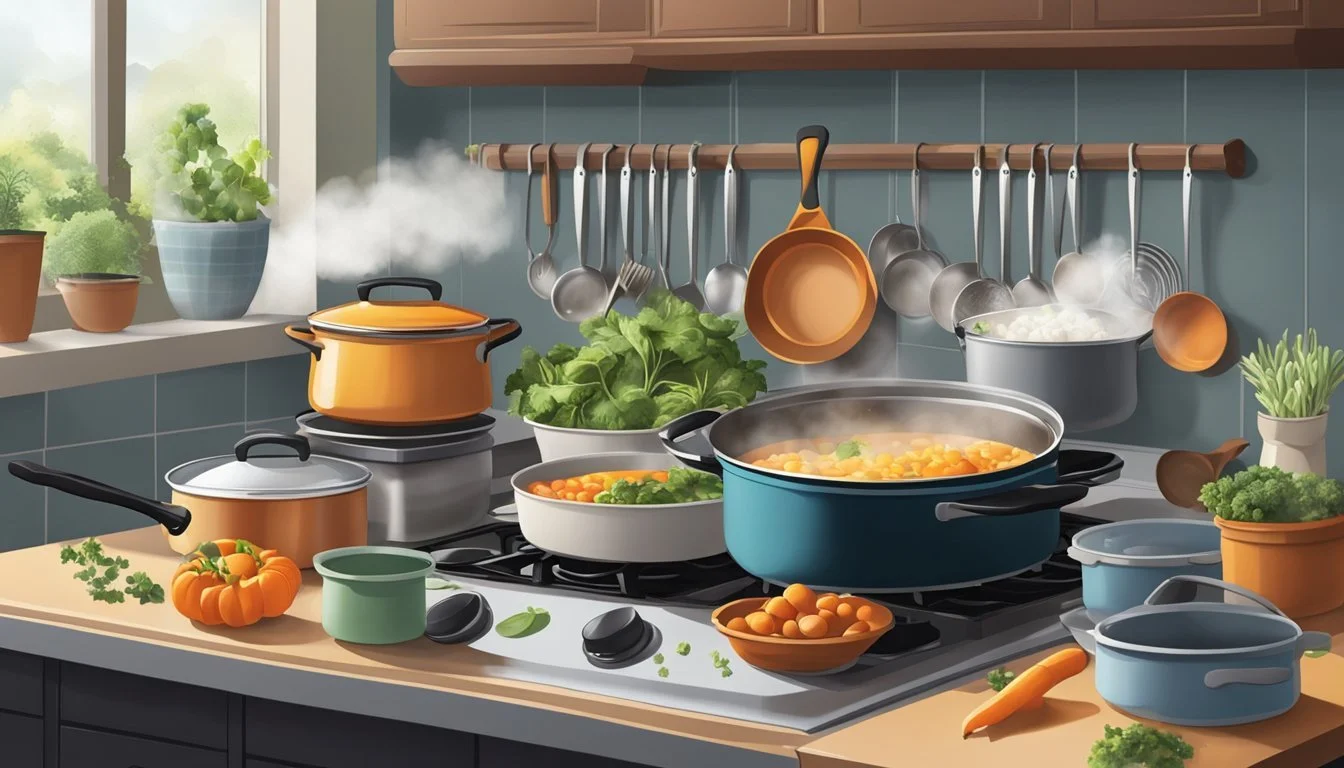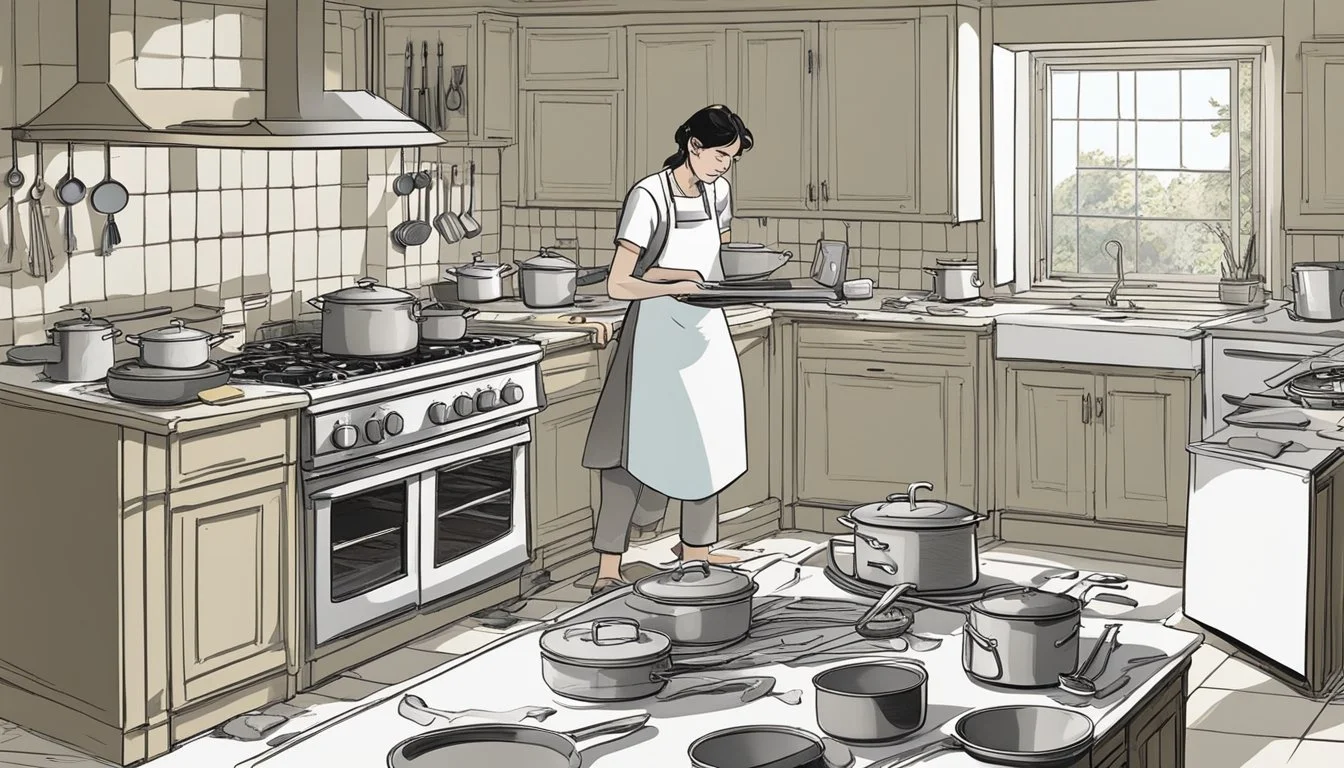How to Cook When You're Trying to Rebuild Your Life
Culinary Skills for Personal Renewal
Rebuilding one's life is a journey that encompasses various aspects of self-improvement and change, including mastering the essential skill of cooking. The relationship with food is a deeply personal one and learning to prepare meals is not just about nourishment but also healing and transformation. Cooking can become a therapeutic activity that restores a sense of control and creativity, which are crucial when putting the pieces of one’s life back together.
In the process of reclaiming one's life, individuals often seek activities that foster a positive mindset and a feeling of accomplishment. Culinary endeavors provide an opportunity for immediate gratification—a successfully cooked meal—as well as the development of a valuable life skill. Furthermore, the act of cooking can mirror the step-by-step method needed to reconstruct a stable life foundation: selecting ingredients represents choice, following a recipe equates to planning, and the cooking process mirrors the effort required to foster change.
Moreover, the kitchen becomes a sanctuary for experimentation and self-expression. It offers a chance to focus on the present and gives an individual the experience of creating something enjoyable and constructive. Cooking can be a personal venture, but it also opens the door to social connections, sharing meals, and building relationships—all of which are important when rebuilding a life.
Embracing a Fresh Start
Cooking can be a therapeutic part of rebuilding one's life, providing not just nourishment for the body but also a sense of routine and accomplishment. It's a vehicle for both change and growth, as the kitchen becomes a place where one can regain control and set a new direction.
Understanding Rock Bottom
Rock bottom is often the foundation upon which one can construct a new beginning. Recognizing this point is crucial as it can catalyze the decision to institute change. When one acknowledges their lowest ebb, cooking can serve as a constructive step in moving forward, time in the kitchen becoming both meditative and a reaffirmation of one's ability to effect positive change in their life.
The Power of a Positive Mindset
Adopting a positive mindset is instrumental in overcoming past challenges and fears. Cooking requires a form of present-mindedness and focus that helps to foster a growth mindset. In the kitchen, every chopped vegetable or perfectly timed dish is an affirmation, a small test of patience and positive action that accumulates to larger transformations.
Setting Clear Goals
To guide one's direction in the kitchen and in life, setting clear, achievable goals is indispensable. Culinary goals might start as simple recipes or the proper use of tools and can evolve into nutritional aspirations or hosting a dinner.
Short-term goals could include:
Learning to cook a healthy staple meal
Organizing the kitchen and pantry for efficiency
Long-term goals might involve:
Mastering a complex dish that demands meticulous attention to detail
Planning a week's meals to align with nutritional targets
Developing these objectives leverages one's strengths and serves as a journey of growth, each meal acting as a stepping stone towards rebuilding and enhancing one's life.
Building a Supportive Environment
When attempting to rebuild life through cooking, one should embrace the concept of a supportive environment, which is crucial for progress. This involves nurturing relationships, developing a robust support system, and using positive affirmations to maintain a constructive mindset.
Fostering Strong Relationships
Cooking can be a communal activity that strengthens social ties. One should engage with family and friends who show understanding and encouragement. By including them in meal planning and cooking sessions, they become partners in one's journey. They provide practical help and emotional support, crucial for staying motivated and focused on reclaiming control of life.
Creating Your Support System
A support system is more than just a social circle; it's a network of relationships that offers validation and resources. One should seek out local cooking classes or groups where experiences can be shared and guidance offered. Online communities are also valuable; they connect individuals with others facing similar challenges. This support system becomes a powerful tool in one's fight towards positivity and progress.
The Role of Positive Affirmations
One's mental environment is as important as their social one. Using positive affirmations in the kitchen can reinforce one's sense of capability. Quotes like "I own my life!" act as daily reminders of one's power and determination. Placing these affirmations around the kitchen can serve as visual cues that support mental strength and a positive outlook.
Developing Healthy Habits
When rebuilding life, it is fundamental to focus on nurturing habits that foster self-care, encourage regular physical activity, and support mental health through mindfulness. These pillars lay a strong foundation for overall well-being.
The Importance of Self-Care
Self-care acts as the cornerstone for rebuilding one's life. It encompasses activities and practices that individuals can engage in regularly to reduce stress and maintain and enhance short- and long-term health and well-being. Intentional self-care routines restore a sense of control and can help individuals heal both emotionally and physically. Nature, for example, offers a serene escape that can reinforce one's self-care practice, whether it's gardening or walking in a park.
Establishing a Workout Routine
A consistent workout routine is crucial for improving one's physical health. Exercise not only strengthens the body but also boosts mental health by releasing endorphins, chemicals in the brain that act as natural painkillers and mood elevators. Simple activities like yoga can be included in a daily routine, which can be performed at home with minimal equipment. Yoga has been found to have numerous benefits, including improving flexibility, balance, and strength.
Sample Workout Routine:
Monday: 30 minutes of cardio (e.g., brisk walking)
Wednesday: 20 minutes of strength training (bodyweight exercises)
Friday: 30 minutes of yoga (Dolphin push-ups, half handstand)
Mindfulness and Meditation
Mindfulness and meditation are practices that enhance mental stability and focus. These practices aid individuals in staying present and engaged in their current activities, which can diminish the prevalence of negative thoughts. Meditation, even for short periods each day, has been linked with improved mood and reduced anxiety. Creating a habit of mindfulness can involve sitting silently for 10-15 minutes or even performing daily activities with intentional awareness.
Mindfulness Tips:
Dedicate a specific time for meditation each day
Focus on your breath or a mantra to stay present
Personal Growth and Learning
In the process of rebuilding one’s life through cooking, individuals have the opportunity to foster personal growth by enhancing their knowledge, diversifying their interests, and practicing self-compassion. Cooking can be both a skill to be honed and a means to engage more deeply with oneself and one's core values.
Harnessing the Power of Education
Learning new skills in the kitchen begins with education. Individuals might start by enrolling in cooking courses or reading books that both instruct on culinary techniques and inspire with new recipes. Growth in the culinary arts is not only a way to create nourishing meals but also a stepping stone to building resilience as each new technique mastered is a tangible display of progress.
Exploration Through Hobbies and Interests
Cooking as a hobby can lead to significant personal development, offering a creative outlet and a way to destress. Individuals might explore various cuisines that align with their values or bring back pleasant memories, thereby restoring a sense of joy and balance in their lives. By engaging in hobbies and interests, one uncovers opportunities for new experiences and connections, sparking continuous growth.
Reflection and Self-Compassion
Incorporating self-reflection into the cooking process promotes self-awareness and compassion. Documenting the cooking journey through notes or a reflective journal allows an individual to observe their evolving skills and mindset. Self-compassion is practiced through acknowledging kitchen mishaps as part of the learning curve, thus nurturing a resilient attitude towards challenges both in and out of the kitchen.
Overcoming Obstacles
In the process of rebuilding one's life and learning to cook, an individual may face a variety of hurdles. Recognizing and addressing these challenges is critical for personal growth and achieving a sense of happiness in the kitchen.
Dealing With Stress and Challenges
Cooking can serve as a therapeutic outlet for those grappling with stress and routine challenges. By creating a structured plan, individuals can turn meal preparation into a stress-relieving activity. They should:
Identify stress triggers: Acknowledge what aspects of cooking or life cause tension.
Develop a routine: Set aside specific times for grocery shopping and meal prep.
This approach allows for the development of a constructive coping mechanism, transforming a daily necessity into a source of comfort.
Moving Beyond Pain and Suffering
Pain and suffering can often lead to a reluctance to engage in activities like cooking, which once brought joy. It's essential for individuals to:
Recognize their pain without shame.
Understand that pain is a common human experience.
By acknowledging these feelings, one can find opportunities within cooking to practice mindfulness, thereby fostering healing and growth.
Transforming Negativity to Strength
Turning a negative mindset into a source of strength involves several strategic steps:
Learn from your mistakes: Treat cooking mishaps as lessons, not failures.
Take action: Incorporate new cooking techniques to enhance skills and boost confidence.
Each culinary success, no matter how small, contributes to an overall transformation, allowing one's self-esteem and competency in the kitchen to flourish.
Reclaiming Control and Direction
Cooking offers a unique opportunity to regain control and redefine direction in one's life post-adversity. Through the culinary arts, individuals harness the power of creativity and discipline, leading to a restoration of confidence and self-assuredness.
Identifying and Pursuing Passions
To rebuild life effectively, one must first identify their passions and pursue them with determination. In the context of cooking, an individual can seek out recipes that resonate with their taste and culinary aspirations, thereby fostering a sense of control and accomplishment. For instance:
Explore Different Cuisines: Compiling a list of various international dishes can ignite culinary passion and broaden one's cooking repertoire.
Set Cooking Goals: Whether it's mastering a complex recipe or learning a new technique, setting concrete goals can lead to tangible achievements and bolster self-confidence.
Navigating Life's Setbacks
Setbacks are a natural part of life and a crucial component in the journey of rebuilding. When facing challenges:
Practice Positive Self-Talk: Replace negative thoughts with positive affirmations related to cooking successes, no matter how small.
Embrace Comfort Foods: Sometimes, preparing a comforting meal can be both therapeutic and a way to regain power over life's unpredictability.
Embracing Change and Adaptability
The process of cooking can teach one to embrace change and adapt. Incorporating flexibility into one's culinary experiences reflects the necessary adaptability for handling broader life changes.
Try New Techniques: Challenging oneself to step outside their comfort zone in the kitchen, like attempting sous-vide or fermentation, can be a metaphor for adapting to new life circumstances.
Reinterpret Recipes: Taking a classic dish and reinventing it with a personal twist demonstrates control over the narrative of one's journey and reflects a positive, adaptable mindset.
Actionable Steps for Rebuilding
In rebuilding one's life, concrete actions trump vague aspirations. Structured approaches in goal setting, personal development, and nurturing oneself are critical in orchestrating a constructive way forward.
Effective Goal Setting
Setting clear goals is the cornerstone of progress and helps prevent the recurrence of regret. One's journey begins with identifying specific, measurable, achievable, relevant, and time-bound (SMART) goals.
Motivation: It depends on having an idea that excites one to move toward their desired outcome.
Clarity: Clear goals offer a sense of direction, unclouded by the haze of indecision or guilt.
Tracking Progress: Regularly reviewing goals enables one to measure progress and learn from mistakes, reinforcing their commitment to positive changes.
Practical Self-Improvement Strategies
Sustainable self-improvement is about incremental, consistent efforts rather than sporadic leaps.
Unplug: Create time for reflection by temporarily disconnecting from digital distractions.
Mistake Management: Transform past mistakes into lessons rather than dwelling in regret.
Encouragement: Seek guidance and encouragement from trustworthy sources, acknowledging that setbacks are a natural part of growth.
Nourishing Body and Mind
A nourished body supports a clear mind, both of which are pivotal in rebuilding one's life.
Diet: Integrate a balance of nutrients that energizes the body and enhances focus.
Mindfulness: Practices such as meditation serve to align one’s mental state with their goals.
Rest: Prioritize adequate sleep as it is essential for cognitive function and maintaining motivation.
Each step put forward is a commitment to transform one's life thoughtfully, stirring away from the shadows of regret and steering towards a nourished and fulfilled existence.







